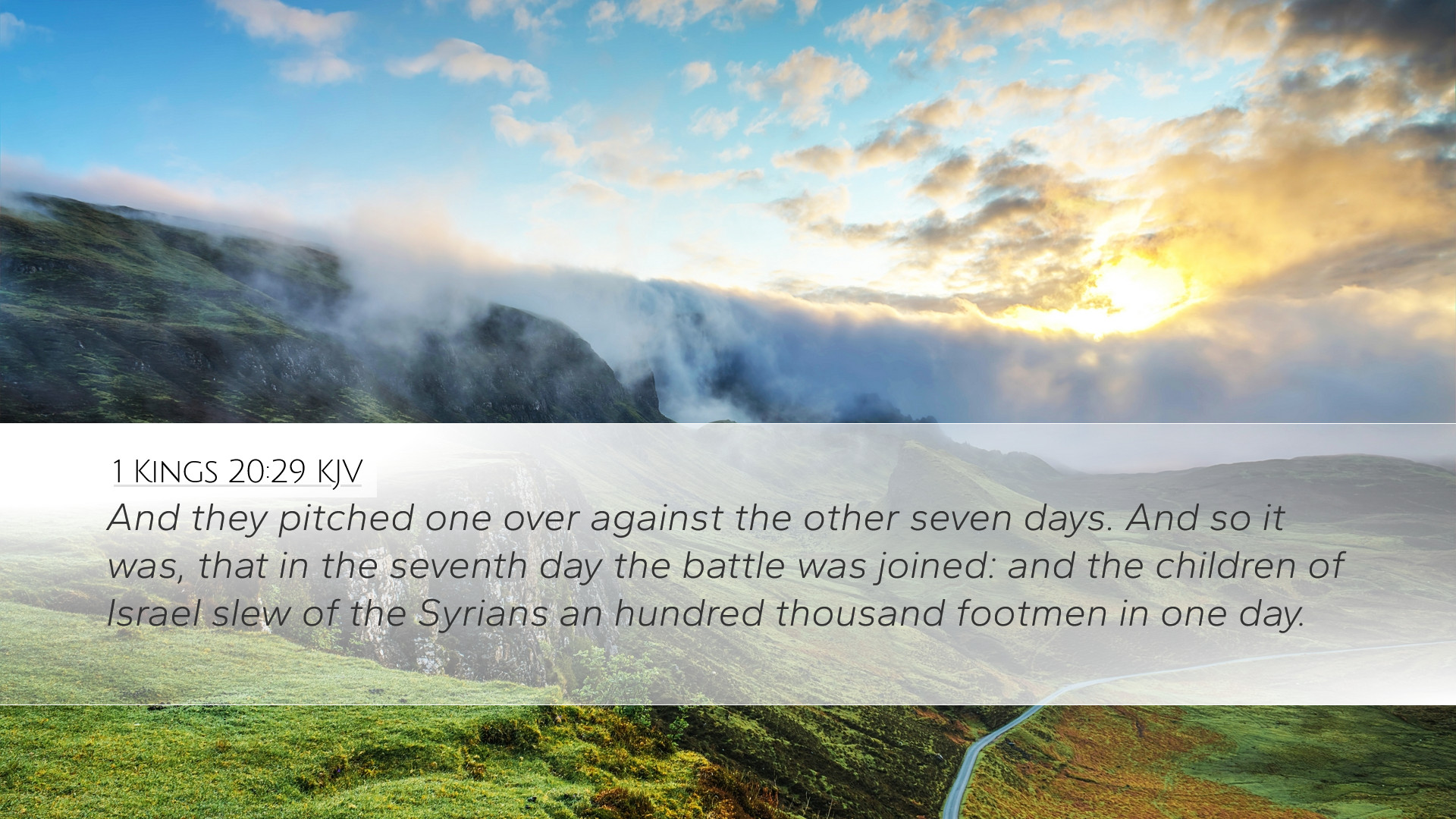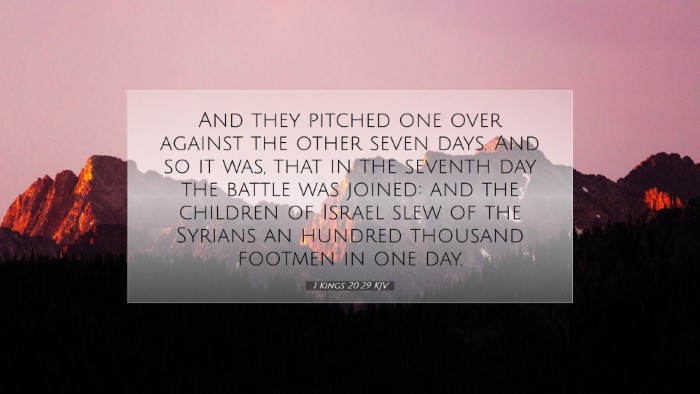Commentary on 1 Kings 20:29
Verse: "And they pitched one over against the other seven days. And so it was, that in the seventh day the battle was joined: and the children of Israel slew of the Syrians an hundred thousand footmen in one day."
Introduction
This passage reflects a significant moment in the conflict between Israel and Syria, showcasing God's sovereignty and power in delivering His people from their enemies. Scholars have highlighted the strategic and spiritual implications of this event, and various public domain commentaries shed light on its meaning for understanding God's purpose in warfare, leadership, and divine intervention.
Contextual Overview
The events described occur after a previous conflict in which Benhadad of Syria besieged Samaria, the capital of the Northern Kingdom of Israel. The narrative illustrates the ongoing hostilities between these nations, marked by God's providential care for Israel amidst adverse circumstances. Notably, the Israelites' victory is portrayed as a clear demonstration of divine power.
Insights from Commentators
-
Matthew Henry:
Matthew Henry emphasizes the significance of the timing of the battle. He notes that the seven days of preparation underscore the anticipation and weight of the impending conflict. The number seven often symbolizes completeness in Scripture, suggesting that the time was ripe for God’s intervention. Henry remarks that God's providence governs battles, and the Israelites' victory serves as a testament to faithfulness in the face of overwhelming odds.
-
Albert Barnes:
Barnes provides a detailed analysis of the military context and strategies employed during the siege. He points out that the prolonged standoff reflects not only the tactical considerations of warfare but also the spiritual warfare taking place. Barnes highlights that the decisive victory was not merely the result of military might, but rather of divine intervention, indicating the importance of relying on God for strength and victory.
-
Adam Clarke:
Clarke’s commentary delves into the symbolic meanings of the numbers and events surrounding this battle. He discusses the ramifications of such a significant loss for Syria, elucidating how it serves as a warning against pride and opposition to God’s people. Clarke connects the text with the broader narrative of Israel's history, emphasizing God’s covenant faithfulness to His people even in their unfaithfulness.
Theological Themes
This passage raises several important theological themes that resonate with pastors, scholars, and students of scripture.
-
Divine Sovereignty:
The ultimate victory of the Israelites is a vivid reminder of God’s sovereignty over nations and rulers. The defeat of such a large force (one hundred thousand soldiers) emphasizes that size and strength are meaningless against the will of God.
-
Faith and Obedience:
The Israelites’ success in battle underscores the necessity of faith in God’s promises. Their preparedness, both spiritually and militarily, illustrates that faith coupled with action leads to divine favor.
-
Judgment and Grace:
The passage also engages with themes of judgment against oppressors and grace for those who trust in God. The destruction of the Syrian forces serves as an act of divine justice, while simultaneously reaffirming God's protective role over Israel.
Applications for Today
For contemporary application, this passage challenges believers to trust in God's sovereignty during struggles, whether personal or communal. It prompts questions about reliance on earthly powers versus divine intervention, an ever-relevant issue for theologians and pastors alike.
-
Trusting God in Conflict:
Church leaders are encouraged to instill confidence in congregations that God is present in their battles, advocating prayer and dependence on divine guidance.
-
The Importance of Unity:
The shared experience of the Israelites in facing their adversaries reminds us of the significance of unity within the Church amidst external pressures.
-
Preparation for Battle:
Both spiritual preparation and active engagement in God's mission are necessary. The groundwork laid in the seven days can be seen as a call to readiness in faith and action.
Conclusion
In conclusion, 1 Kings 20:29 serves as a powerful testament to God's involvement in the affairs of nations and His unwavering support for His people. The insights from Matthew Henry, Albert Barnes, and Adam Clarke converge to illustrate a complex interplay of faith, divine sovereignty, and human agency. For pastors and theologians, this passage serves not only as a narrative of historical significance but also as a rich source of theological reflection, encouraging a deeper trust in God amidst life's myriad battles.


